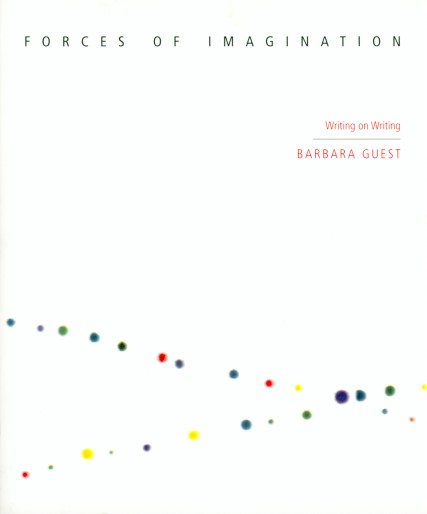Forces of Imagination |
| Writing on Writing, by Barbara Guest. Cover and interior images by Laurie Reid. |
 |
|
Kelsey St. Press,
Berkeley, California, 2003. 108 pages, $14 |
Comments on Forces of Imagination |
| We expect poets to give a first-hand account of what poetry is. But
some poets, when they write criticism, produce a kind of prose that is
itself on the verge of being poetry. Valéry, Stevens and Marianne Moore
belong to this "visionary company." And so does Barbara Guest, whose
writings on poetry, collected here, are among the most inspiring works of
their kind. It is a deep pleasure to know that such writing can still
exist.
— John Ashbery* |
| In this companion to her important poetry, Barbara Guest may be said
to advance a poetics amazed in its dreaminess and lyrical in its critical
register. No wonder the Symbolist poetics from which she takes her core
meaning is as integral to her poetry as it is: it is the way she thinks!
Her aphoristic plasticity is affirmative, affirmative in performing
imaginative acts on our behalf.
— Marjorie
Welish* |
| Guest has earned her formidable reputation through dedication to
modern lyric's difficult double-project of making song think and making
thought sing, of stretching the very medium of conceptual thought —
language — all the way toward music and affect, but without relinquishing
any of the rigor of conceptual intellection. The essays, talks and
addresses, and prose and verse meditations now gathered in Forces of
Imagination offer welcome points of entry into Guest's challenging
aesthetic.
— Robert Kaufman, Stanford
University* |
| Writing about thinkers, poets and writers as diverse as Baudelaire,
Mallarmé, Plato, Walter Benjamin, Kant, Pasternak, Machado de Assis, H.D.,
Horace, Wallace Stevens and Pound; about radical and conservative poetics,
modernism, postmodernism, the relationship between art and poetry; about
the importance of imagination and surprise in poetry, Barbara Guest
situates herself in a multi-faceted literary landscape spanning centuries
and continents, at the same time providing brilliant insights into the
roots and workings of contemporary poetry. This is an evocative collection
of essays and poems on writing that might be quite provocative to a
certain audience steeped in the poetics of academia. Fascinating reading
for anyone interested in the possibilities of modern writing.
— Johannes Beilharz |
| *Quoted from the back cover of the book. |
| Barbara Guest EPC home page |